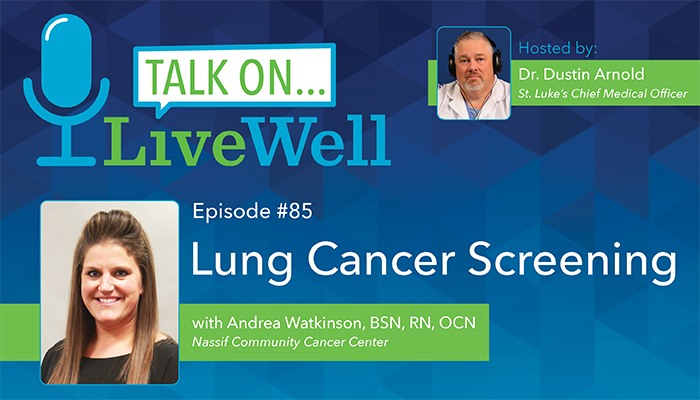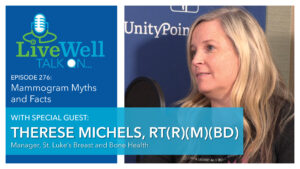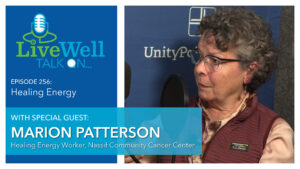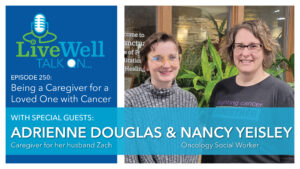Andrea Watkinson, manager – Clinical Services, at the Nassif Community Cancer Center, joins Dr. Arnold to discuss lung cancer screening, who’s a candidate for screening and more.
Subscribe on: Apple Podcasts | Google Podcasts | Spotify | iHeart Radio | Pandora | SoundCloud | Stitcher | TuneIn
Host
Dr. Dustin Arnold
Chief Medical Officer
UnityPoint Health – St. Luke’s Hospital
Guests:
Andrea Watkinson
Manager- Clinical Services
Helen G. Nassif Community Cancer Center
Transcript
Dr. Arnold:
This is LiveWell Talk On lung cancer screening. I’m Dr. Dustin Arnold, chief medical officer at UnityPoint Health-St. Luke’s Hospital. Lung cancer is the leading cause of cancer death in both men and women. The greatest possibility of becoming cancer free, is to detect it early. And that can be done with a lung check, a type of screening effective for diagnosing lung cancer at the earliest, most treatable stage. Joining me to talk about this is Andrea Watkinson manager of clinical services at the Helen G. Nassif Community Cancer Center. Welcome.
Andrea Watkinson:
Thank you.
Dr. Arnold:
First off, what is a lung check screening?
Andrea Watkinson:
So a lung check is a chest CT scan, which is a rapid noninvasive test that uses a low dose of radiation to provide a three dimensional image of the lung in just a matter of seconds. So ultimately a CAT scan of the chest just done at the lowest dose of radiation we can give it at and still get a better image than what somebody would get on a chest X-ray. So when people come in for a lung check, they’re going to meet with one of our lung screening coordinators. And are also given a lung cancer risk assessment, personal cancer reduction and smoking cessation information. And then if the patient is interested in tobacco cessation or quitting smoking, then we can assist with those referrals to the appropriate provider.
Dr. Arnold:
Do you know what the radiation exposure is compared to like a normal CAT scan of the chest?
Andrea Watkinson:
No, I don’t. I know it’s significantly less. I want to say a third but that would be me speculating.
Dr. Arnold:
Okay. That might be a good speculation actually. I think that does sound right, about a third of the radiation exposure. Because that’s the risk. You know, you’ve taken people without a cancer, potentially expose them to radiation and then subsequently….
Andrea Watkinson:
Correct. That’s correct.
Dr. Arnold:
Who is a good candidate to have this done?
Andrea Watkinson:
So with the lung screening, there is specific criteria that a person has to meet in order to qualify for their insurance to pay for it. So a participant needs to be the age of 55 to 77 years old, current smoker or have quit smoking in the last 15 years. And then have at least a 30 pack year history of smoking. So that would be about equivalent to a pack a day for 30 years, two packs for 15 and then no imaging of their chest in the last 12 months.
Dr. Arnold:
Okay. And why is that? The no imaging?
Andrea Watkinson:
Just with the low dose of radiation, if they’ve had imaging in the last 12 months, insurance won’t cover it because they don’t feel that it’s necessary. Just in the studies that they’ve done, we’re looking at a 12 month period.
Dr. Arnold:
Sure that makes sense. And if the insurance doesn’t cover it, is there an ability for the patient to pay for the exam?
Andrea Watkinson:
Currently there’s not. In the past when the lung screening started, St. Luke’s actually was one of the first people to offer it as a self pay program. However, once Medicare started covering it, we were no longer able to accept self-pay payments for it outside of offering to bill it through their insurance. If the patient doesn’t meet the eligibility criteria and they want to proceed, we’re willing to do it. They would just have to pay out of pocket, which a self pay out of pocket for this exam is about $1,300. So most people aren’t wanting to do that. But if they did, we would be happy to talk that through with them.
Dr. Arnold:
A couple of questions come up when we do diagnostic screenings and we’ve talked about these pay out of pocket, sort of cardiovascular screenings on previous podcasts. So let’s go with what if we find something that’s not related the lungs, how does that handle?
Andrea Watkinson:
So when the results come back, they go back to the ordering provider or their ordering doctor and then it’s up to them to get them to the appropriate people. But if we find something, then they would switch to a diagnostic scan. So that’s something that ultimately isn’t covered through their insurance. And with the insurance coverage too. A Medicare patient, I would say 99% of the time never has a payment for this lung screening program. It’s people who have private insurers like Blue Cross or something like that where again, the screening is covered as long as they meet the criteria. However, based on their coverage and benefits, they may have a copay. So again, the financial aspect from this, I mean, if you do meet these criteria, we strongly encourage people to have this done. We tell people that if we can find a lung cancer early looking at the costs, that it would save them down the line with maybe needing chemo and radiation and things where if we can detect it as an early stage, we’re hoping that we can operate and cure them that way. Or potentially SBRT radiation, which is just targeted to that tumor area.
Dr. Arnold:
So for clarification, the SVR radiation is radiation that’s isolated to a small field rather than…
Andrea Watkinson:
Right. And really with that it’s used for if people don’t want to go through the surgery or maybe they have too many comorbidities, that they’re not a good surgical candidate. A heart condition or something like that. But they still want treatment and they’re eligible for treatment, then that’s the best option for them. It’s typically five treatments is all that they get a couple times a week and then they’re done.
Dr. Arnold:
So a physician is looking at this to look for things other than lung disease or lung cancer. What if there’s a lung cancer? What happens next?
Andrea Watkinson:
So if there’s a lung cancer detected, typically what we see is if a primary care physician ordered the screening, they will then refer them to our pulmonology group here. And then we proceed with the biopsy, get the biopsy done. And then once it’s a confirmed cancer, then they get on the track with our multidisciplinary thoracic oncology team here. So being presented at a multidisciplinary care conference where we have surgeons present and pulmonologists present, interventional radiology present. Radiation, oncology, all getting a plan together for that patient to maximize their outcome. Which I feel like is a huge thing for us that we do here at St. Luke’s. Not every hospital does that or a lot of times those are done at the bigger academic centers. But then really getting them transitioned to their treatment quickly. I mean, we want to make sure that everything is done, but it’s not uncommon for us to have a patient scheduled for surgery within a month of when a long screening is done.
Dr. Arnold:
And that’s the concern always. You know, hey you’ve got a positive chest that looks like you have cancer and we are gonna get you in, in six weeks. You know, you can imagine the anxiety a patient, the patient’s family would have. Off the top of your head, what percentage of these screenings that are completed have findings consistent with lung cancer?
Andrea Watkinson:
Here at St. Luke’s we have about a 2% rate, which actually is higher than the national average. We’re finding more than the national average, which for us, we’re looking at that as a good thing. Our providers here in Cedar Rapids are really dedicated to this program, especially when insurance started helping to cover it so people could more financially be able to do this. So we’re excited about that. And we hope that, again, not that you want to find cancer in somebody, but to find a lung cancer at an earlier stage. I mean, that’s a blessing. I guess if you ask me.
Dr. Arnold:
So if I’m 55 and I’ve smoked, have a 30 pack year history. And I received the screening, it’s negative. Is there a time that I should have repeated in the future?
Andrea Watkinson:
Yup. So we recommend, or the national guidelines recommend that you have a low dose screening annually, even if it’s completely negative. If we see nothing at all. It is done annually until you fall outside of the criteria. So typically, either you hit the age of 77 or you’ve been tobacco free or smoking free for 15 years.
Dr. Arnold:
Okay. So your 30 pack year history goes away is what you’re saying?
Andrea Watkinson:
The 30 pack year history, they’d carry that forever. But yeah, being 15 years outside of their last cigarette. Yeah. So if people would have quit smoking and then they start again, it really kind of starts all over again.
Dr. Arnold:
Okay, alright, that’s good to know. How can someone get screened? Is it only through their primary care physician or if I’m a patient and I hear this podcast and I just pull the car over, don’t talk. If you’re listening in the car and I could just call the center and get in?
Andrea Watkinson:
Absolutely. So we would need an order, but the cancer center will work with their primary physician to get that lined up. So if somebody listens to this or sees something and they’re interested, I would encourage them to call the cancer center. So the main number for that is (319) 558-4876 and then they can just ask to speak to one of the lung care coordinators and then we will work with that person. If they meet the criteria, then we’ll reach out to their doctor to get an order and would be happy to get them scheduled and get them going.
Dr. Arnold:
That’s it. That’s really a nice service because this has been a debate for a long time about screening for lung cancers. That are you creating more of a problem by finding other things that lead to diagnostic tests if the patient wouldn’t have had. So this is really neat. This is changing people’s lives.
Andrea Watkinson:
Yeah. And it’s interesting. I mean you asked about the follow up and sometimes that’s hard for people to want to follow up on something that’s negative when we don’t see anything. But we have had several people in the last, you know, I would say three years that their initial screening was okay or maybe they had a nodule and over the years following it we have detected a cancer. But again, those have been people that have had an operable cancer and that now are cancer free. When if we wouldn’t have been watching it, you know, you don’t find something on these unless it’s an incidental finding or we’re doing a lung screening most of the time with the lung cancer.
Dr. Arnold:
By the time a lung cancer, particularly small cell shows up on a plain radiograph, plain chest x-ray, it is probably metastasized by the time it’s easily seen on a chest X-ray. So one last question. Why did you choose to work in the Cancer Center? How did you end up there?
Andrea Watkinson:
So it started just kind of as a fluke. Oncology was about the only place that I didn’t get to go in nursing school. So when I graduated it was one of the first jobs I took just before I decided where I wanted to be. And then once I got here, I’ve just never left. So I feel like in oncology, we have constant challenges that continue to help me grow both as a nurse and as a person. And I get the opportunity to work with people who may be getting the worst news of their lives and then have the challenge to do my best to make it a positive experience for them. I enjoy getting to know patients and their families and developing a relationship with them and there’s no bigger reward than watching them transition to their survivorship.
Dr. Arnold:
Well, this is really valuable information. Thanks so much for taking the time to talk about this again. That was Andrea Watkinson, manager of clinical services at Helen G. Nassif Community Cancer Center. For more information, visit communitycancercenter.org/prevention/lung-cancer-screening/. If you have a topic you’d like to suggest for our LiveWell Talk On podcast, shoot us an email at stlukescr@unitypoint.org and we encourage you to tell your family, friends, neighbors about our podcast. Until next time, be well.







